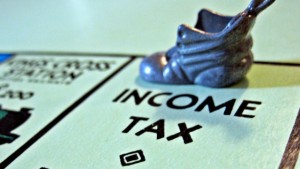Home » Commentary » Opinion » The tax issues were mishandled
· Ideas@TheCentre
 The recriminations about the election are well under way, but have largely excluded discussion about tax — an unfortunate omission.
The recriminations about the election are well under way, but have largely excluded discussion about tax — an unfortunate omission.
The tax burden was expected to go up under either major party, but by much more under the ALP; going well above its previous all-time high. This point was first made by the CIS and then in the Financial Review.
The ALP’s plans were for the tax burden to reach levels $9.7 billion above the previous record set by the Coalition in 2005 — despite the ALP criticising the Coalition for this earlier record tax burden. The coming burden was set to hit 24.8% of GDP in a decade, which is $19.2 billion above the cap (23.7% of GDP) that the ALP previously, and frequently, argued it would adhere to.
These contradictions were missed in the campaign, with the overall tax burden rarely discussed.
There was also pretty facile discussion of individual taxes. Unfortunately, it might seem that the company tax cut was poor politics. However, it was good policy : perhaps even great policy. But, like many other major reforms — such as cutting tariffs and privatisation — it is not good politics in the short term. The political benefits show up in the longer term.
Politically, perhaps the Coalition should have proposed a company tax cut fully funded by base broadening measures, if any still exist, or (preferably) cuts to business subsidies. This would have forestalled the fallacious arguments that big business, foreigners and rich people gain most from the tax cut.
The Coalition also failed to argue against proposed tax hikes. The Coalition largely did not challenge the ALP’s policy to reinstate the 2% temporary deficit levy on high income earners. And why was the Coalition largely silent on the ALP’s proposed large increase in capital gains tax? Why didn’t they argue this would cripple innovation, small business retirement plans, and plans to make Australia a financial centre, while overtaxing most capital gains?
The debate over negative gearing was slightly better, but the focus was often on whether the rich or the poor benefit, even though the arguments were often wrong and largely second order to the debate over the policy itself.
Overall, a lamentably poor campaign for those wanting a better tax system with lower tax levels.
The tax issues were mishandled